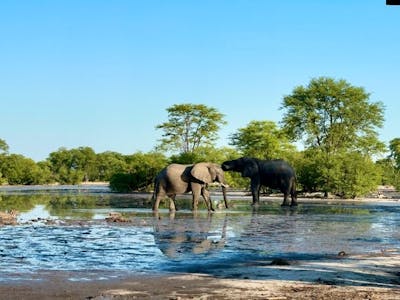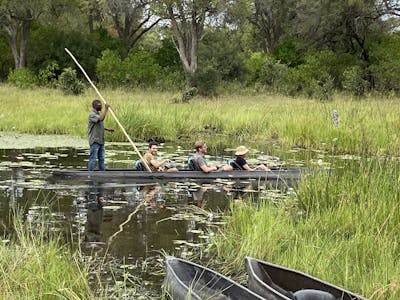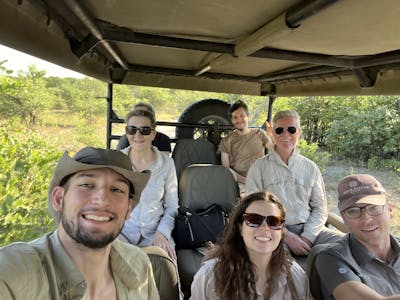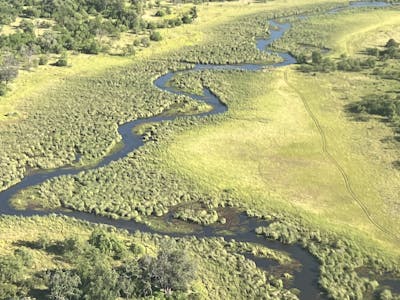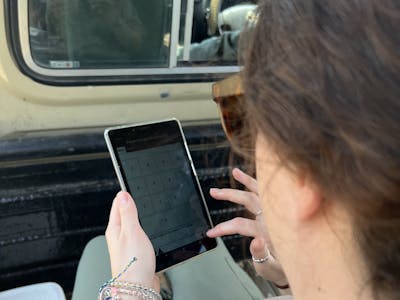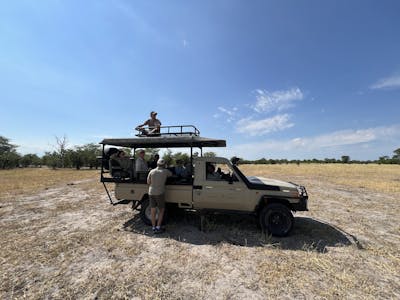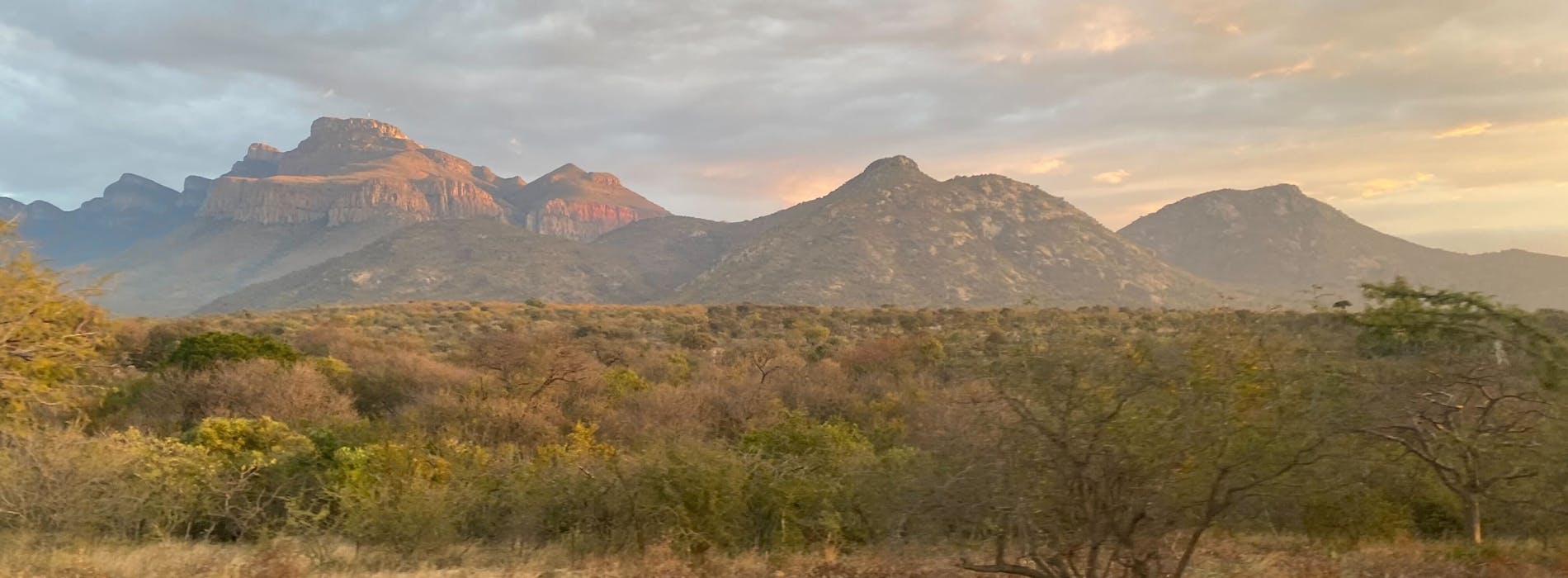
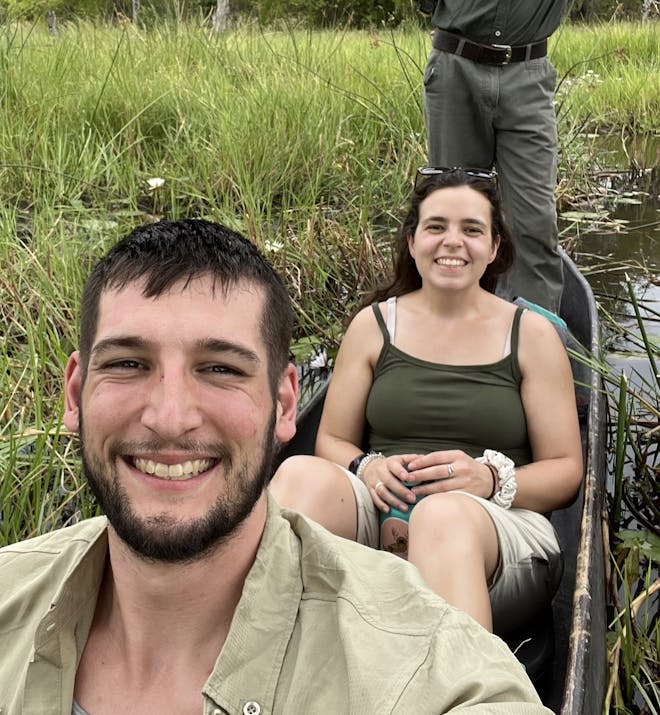
Josie and Adam Smeltzer
Country
🇺🇸 United States
Length of Trip
14 Nights
Project Year
2024
We decided to join The Okavango Wilderness Project because we have always wanted to visit this area and see the Delta. It has been our favourite location in any documentary series, and we have done a lot of research on the area. The biodiversity and uniqueness of it being an inland river delta that does not flow anywhere else except the Kalahari is so interesting. We have always thought it was breathtakingly beautiful and we wanted to experience it for ourselves.
The campsite at the project is lovely. We expected a basic dome tent with only a sleeping bag, but we were thrilled to find a wonderful safari tent with a comfortable mattress, blankets, and a pillow. Moreover, each tent has its own chemical toilet, which comes in handy if you're afraid to walk to the bathroom at night. There are chairs and tables on the porch, so you can relax in front of your tent in the evenings and take in the beautiful surroundings. The campsite has a shower and toilet block, hot running water, and a fully equipped kitchen and living room - what more could you want?
Our favourite spot was the fire pit, where the volunteer team would gather around in the evenings to talk about the day.
The camping aspect helped us develop a close-knit community with the other team members. As a group, we spent a lot of time together out in the field and relaxing at the camp. We especially enjoyed reading Dr. Winterbach's research together and exploring the campsite. We found porcupine quills, ivory shards, and even old bones.
Josie: Doing this as a couple was really special. This was Adam's dream and has been something he has wanted to do, so to see it through his eyes and experience his excitement made it even better.
Adam: Josie is so passionate about wildlife conservation, so my interest in the ecosystem and Josie’s understanding melded beautifully during this entire experience. It is also a rural and remote location, so to have somebody to lean on was perfect.
Each day of the project was so different. It would usually start bright and early with breakfast consisting of cereals, fruits, bread, tea, and coffee. Then out on the morning drive, where we would search for wildlife to monitor and collect data on.
With carnivores, we would identify their tracks and document them using a Cybertracker program. We used a rangefinder to identify the distance of the animals from our car, and we would record information such as species, gender, age, environmental factors, and number of individuals.
All the data we collected went to Dr. Winterbach for his research on wildlife conservation and policy changes, which is really important in this region.
After the morning rounds, we would relax at the camp for a few hours before the evening drive. This was because the wildlife was mostly active during the morning and night. Some days, we started as early as 5am to increase our chances of seeing the predators instead of just their tracks. We saw caracal and hyenas on those days, making it very worthwhile. Other days, we had lunch on the road, as we were out on tracks all day.
It was exciting to see the mammals, but also the birds and plants, as the team were very knowledgeable about all living things in the area. They wanted us to understand how plant life impacted the ecosystem and was all connected. Tracking was our favourite part of the project because of how in-depth and beautiful the science was. Every day was different and exciting, with something new to learn and discover.
Josie: One of the highlights of my trip was when I witnessed a lion killing a zebra. It was a mixed emotional experience because I had been watching the zebra herd for a little while, and I think they are wonderful animals. Suddenly, they started running! Then I saw a lioness take off and I was in awe.
I did not even know she was lying there. It was like watching National Geographic live in front of the vehicle and I didn't know how to process it. Eventually, the lioness killed the zebra. I was happy for the lion to get a meal but sad for the zebra. Witnessing such a natural occurrence reminded me of how unpredictable nature can be.
Adam: One of our most memorable experiences was when we were overnighting at the mobile camp and heard lions roaring in the morning. The team quickly got into a truck and drove towards the sound. Here I saw two male lions talking to each other, and taking over the pride! One of the female lions ran away in the opposite direction, while the second one was hesitant to leave.
Our guide thought that the second lioness might have cubs nearby and was trying to lure the males away to protect them. The two new male lions then invaded the territory and chased the females away. It was a surreal moment to witness the interaction between the same species that you only read or hear about.
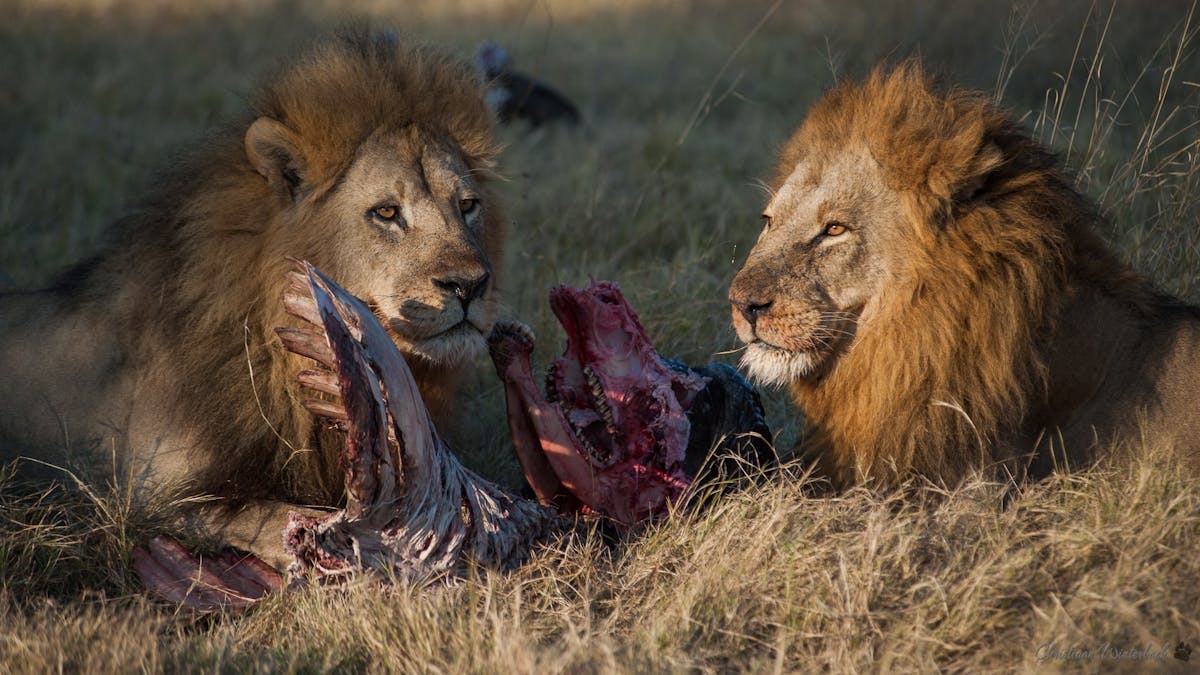
A few days later, we saw a vastly different behaviour within the same species! There was another pride of lions enjoying themselves on a zebra carcass. There were males and females, all intermingled and completely at ease with each other.
We loved watching a baby elephant that couldn't use its trunk yet. It was around three months at the water hole with its family. It kept coming out of his mom's legs and pretending to charge at us. A very spicy little one!
The sightings at this project were unbelievable, resulting in a very long list! We had the incredible opportunity to see lions multiple times, which was truly amazing! We also observed and collected interesting data on the giraffes in this region.
As expected, we saw hundreds of elephants, which is unsurprising due to their abundance in Botswana.
During our stay at the campout site, we were fortunate to be near a watering hole where we witnessed hundreds of elephants coming and going. It was an incredible sight to see family units of 20+ individuals enjoying themselves, drinking, bathing, and keeping cool.
We encountered various species of ungulates such as duiker, impalas, sables, oryx, eland, waterbuck, reedbuck, roan antelope, and zebras.
Adam: Primate sightings were also a nice surprise! Particularly vervet monkeys which were everywhere. They were quite cheeky and got into the garbage at our campsite, causing a bit of a commotion.
Josie: I was thrilled to spot crocodiles and hippos, which were a regular sight, with 30 to 40 hippos in the water at times.
The bird species we saw were truly incredible! The lilac-breasted roller is now our favourite. We were lucky enough to spot about four or five secretary birds, which the team informed us were quite rare. Every day we observed a new species, making it an unforgettable experience.
Our tip for The Okavango Project is to put some money to the side for the optional excursions offered. We went on the Mokoro (canoe through the waterways) and the aerial flight over the delta, which were fantastic value for money. When you take a flight up and over the region, you get to see everything in person with your own eyes, it goes right to your core. It's everything you've ever wanted.
The Mokoro cruise is nice and relaxing, after hours on the dirt track. On the water, you gain so much knowledge of life within the floodplains and the history of the bush, local communities, and the animals. It gives you such an understanding of Botswana’s culture and its relationship with wildlife. We even saw an elephant in the water, and one of the guides made a noise to make it go away, and it did. We passed by, and then the elephant came back and started eating again - truly unforgettable!
African Conservation Experience was one of the best decisions we’ve ever made. The ACE team took care of us through the entire process and they are incredible people. I cannot say enough about the Okavango and the project staff. If you are looking for an unforgettable volunteer experience, you need not look any further.
During our time on the project, we learned so much about bush life, wildlife, and the ecosystem. This is particularly important in remote and wild places like this, where wildlife impacts people's lives in numerous ways. We have gained an authentic understanding and a new perspective on many things, which we will carry with us forever.
This experience has made us better people and taught us so much. It's only when you meet the people who live there and hear about their experiences and struggles that you start to gain a deeper understanding.

